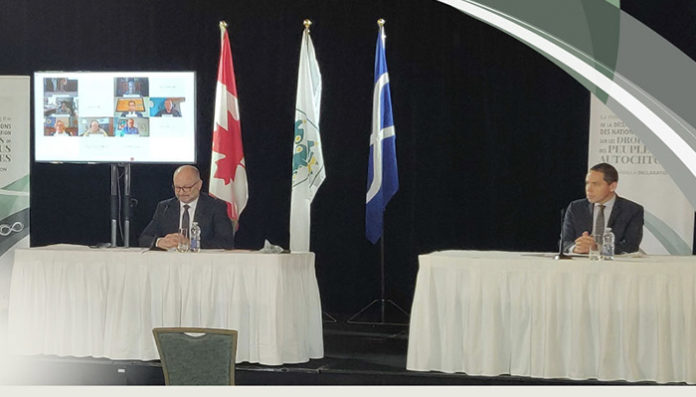
The Honourable David Lametti, Minister of Justice and Attorney General of Canada, and the Honourable Carolyn Bennett, Minister of Crown-Indigenous Relations, announced the introduction of Bill C-15, United Nations Declaration on the Rights of Indigenous Peoples Act. The Ministers were joined by Assembly of First Nations National Chief Perry Bellegarde, Inuit Tapiriit Kanatami President Natan Obed, and Métis National Council National Spokesperson David Chartrand, among others, for the announcement.
In 2016, the Government of Canada endorsed the United Nations Declaration on the Rights of Indigenous Peoples (the “Declaration”) without qualification, and committed to its full and effective implementation. Bill C-15 proposes to affirm the Declaration as a universal international human rights instrument with application in Canadian law. The Bill also provides a framework for its implementation by the Government of Canada.
If passed by Parliament, Bill C-15 would require the Government of Canada, in consultation and cooperation with Indigenous peoples, to take all measures necessary to ensure that the laws of Canada are consistent with the rights of Indigenous peoples set out in the Declaration, as well as to develop an action plan to achieve its objectives.
This legislation responds to the Truth and Reconciliation Commission Call to Action 43, which calls on all orders of government to fully adopt and implement the Declaration as the framework for reconciliation. It also responds to the National Inquiry into Missing and Murdered Indigenous Women and Girls’ Calls for Justice.
Using former Bill C-262 as a starting point, the Government of Canada worked closely with the Assembly of First Nations, Inuit Tapiriit Kanatami and the Métis National Council over the last several months to shape this legislative proposal. Valuable input was also received from modern treaty and self-governing nations, other national and regional Indigenous organizations, rights holders, organizations representing Indigenous women, two-spirit and gender-diverse people, and Indigenous youth. The input received from these collaborative engagements informed the development of the Bill. The Government of Canada also held discussions with provincial and territorial governments and industry stakeholders to better understand and reflect their perspectives.
Bill C-15 is about protecting and promoting the rights of Indigenous peoples including rights to equality and non-discrimination, self-government and the inherent right to self-determination. It also highlights the importance of respecting and promoting the rights in treaties, agreements and other constructive arrangements between the Crown and Indigenous peoples.
The Government of Canada has already taken action to reflect the Declaration in legislation, including An Act respecting First Nations, Inuit and Métis children, youth and families and the Indigenous Languages Act and Bill C-15 represents another step forward.
If passed, this Bill will represent another important step forward in our collective reconciliation journey- one that would open the way to greater opportunities for lasting relationships with Indigenous peoples, closing socio-economic gaps and promoting greater prosperity for today and for future generations.

Quotes
“Each and every one of us has a responsibility to build a stronger, fairer and more just society for today and for future generations. Bill C-15 represents an important step forward in our collective reconciliation journey- rooted in the recognition of Indigenous rights, respect, cooperation and partnership. Working in full partnership with Indigenous peoples, the bill will chart the course to full and effective implementation of the United Nations Declaration on the Rights of Indigenous Peoples, and the inherent rights that it protects and promotes. Once passed, this will bring us another step closer to a brighter future for Canada, one where all our children and grandchildren can prosper and thrive.”
The Honourable David Lametti, P.C., Q.C., M.P.
Minister of Justice and Attorney General of Canada
“The United Nations Declaration on the Rights of Indigenous Peoples affirms the human rights of Indigenous peoples and provides all of us with an important roadmap for advancing reconciliation in Canada. The implementation of the Declaration will accelerate progress in addressing our colonial legacy and moving to an approach that affirms Indigenous Peoples’ inherent rights. Building on the work of the former Member of Parliament, Romeo Saganash, the proposed legislation will help us to further implement the Declaration in partnership with First Nation, Inuit and Métis partners. Today is another step forward as we continue to chart a new path together toward a renewed relationship and a better, more inclusive future based on the affirmation of rights, respect, co-operation and partnership.”
The Honourable Carolyn Bennett, M.D., P.C., M.P.
Minister of Crown-Indigenous Relations
Quick Facts
- The United Nations Declaration on the Rights of Indigenous Peoples is an international human rights instrument that affirms the minimum standards for the survival, dignity and well-being of Indigenous peoples throughout the world.
- The United Nations General Assembly adopted the Declaration in 2007 by a vast majority of member states and is now supported by an even larger number of states, including Canada.
- The Declaration is the result of almost 25 years of collaboration between UN member states and Indigenous peoples from around the world. Indigenous leaders from Canada played a significant role in its development, including the drafting and negotiating.
- The Declaration includes 46 articles that affirm a broad range of collective and individual Indigenous rights, including rights related to:
- self-determination and self-government
- equality and non-discrimination
- culture, language and identity
- lands, territories and resources
- Indigenous institutions and legal systems, among other rights
- Implementing the Declaration responds to the Truth and Reconciliation Commission’s Call to Action 43, and the National Inquiry into Missing and Murdered Indigenous Women and Girls Calls for Justice.
Source: canada.ca











